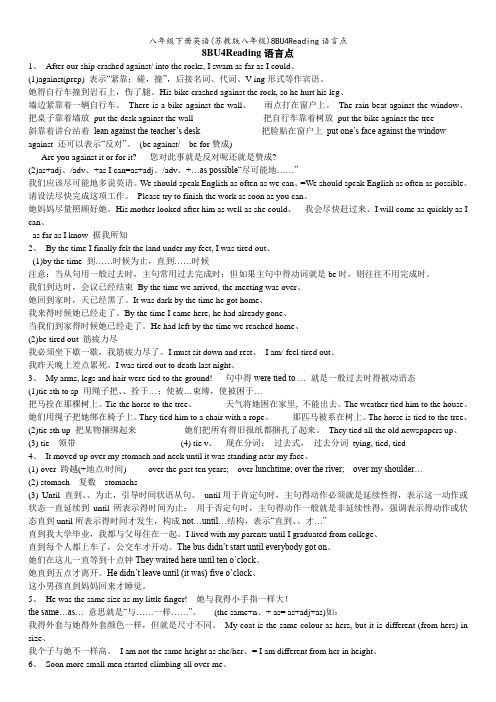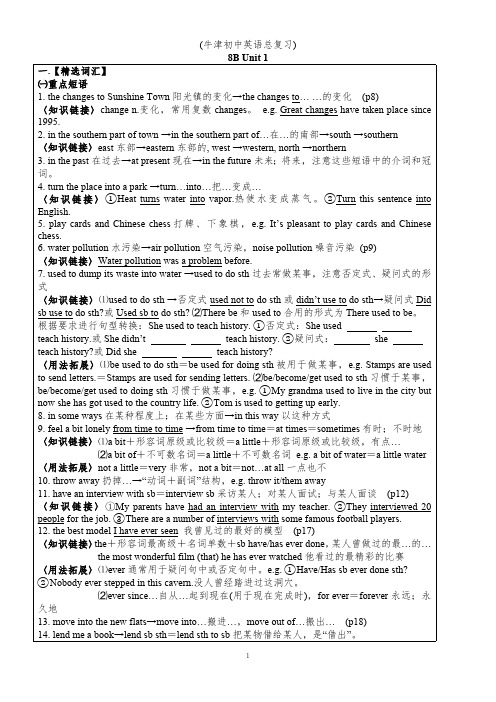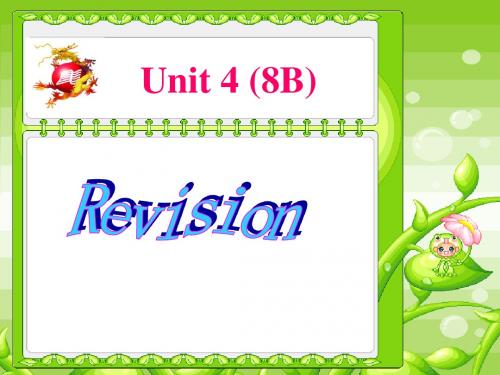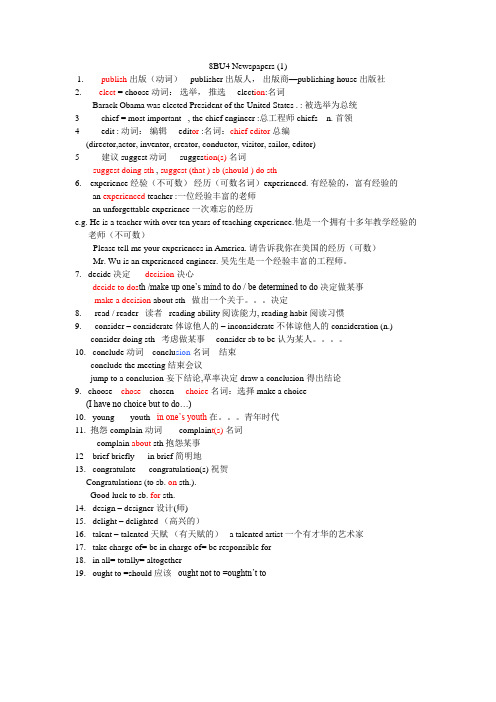苏教版中考英语复习各单元要点8B U4
- 格式:doc
- 大小:66.00 KB
- 文档页数:3

8B Unit4 A good readComic strip&Welcome to the unit1. Have you decided what to do with these books? 你已经决定怎样处理这些书了吗?do with意思是:“对付,处理”,相当于及物动词,在特殊疑问句中,do with 与what 搭配使用。
例:What do you do with this problem? 你怎样处理这个问题?拓展:deal with也意为“对付,处理”,用于特殊疑问句中,与how 搭配使用。
例:I don’t know how to deal with the problem. 我不知道怎样处理这个问题。
2. I have to use them to reach the box on the fridge.我得用它们来够冰箱上的书。
1)use sth. to do sth.意思是:“用某物来做某事”,也可用为use sth. for (doing) sth.。
被动语态为:sth. be used to do sth.例:We use computers to play games.= Computers are used to play games. 我们用电脑玩游戏。
2)reach 为及物动词,意为“够到,到达”I’m too short to reach the apple on the tree. 我太矮了,够不着树上的苹果。
3. They improve my knowledge of the past. 它们提高我对过去的认识。
Knowledge是名词,意为“知识,认知,学问”,后可接of的短语作定语或that从句作同位语,表示关于某方面的知识或对某人或某事的了解或理解,此时knowledge前须加定冠词the。
例:He is poor in money, but rich in knowledge. 他贫于金钱,但富于学问。

8BU4Reading语言点1、After our ship crashed against/ into the rocks, I swam as far as I could、(1)against(prep) 表示“紧靠;碰,撞”,后接名词、代词、V-ing形式等作宾语。
她得自行车撞到岩石上,伤了腿。
His bike crashed against the rock, so he hurt his leg、墙边紧靠着一辆自行车。
There is a bike against the wall、雨点打在窗户上。
The rain beat against the window、把桌子靠着墙放put the desk against the wall 把自行车靠着树放put the bike against the tree斜靠着讲台站着lean against the teacher’s desk把脸贴在窗户上put one’s face against the window against 还可以表示“反对”。
(be against/ be for赞成)Are you against it or for it? 您对此事就是反对呢还就是赞成?(2)as+adj、/adv、+as I can=as+adj、/adv、+…as possible“尽可能地……”我们应该尽可能地多说英语。
We should speak English as often as we can、=We should speak English as often as possible。
请设法尽快完成这项工作。
Please try to finish the work as soon as you can、她妈妈尽量照顾好她。
His mother looked after him as well as she could、我会尽快赶过来、I will come as quickly as I can、as far as I know 据我所知2、By the time I finally felt the land under my feet, I was tired out、(1)by the time 到……时候为止,直到……时候注意:当从句用一般过去时,主句常用过去完成时;但如果主句中得动词就是be时,则往往不用完成时。

(牛津初中英语总复习)8B Unit 1一.【精选词汇】 ㈠重点短语 1. the changes to Sunshine Town阳光镇的变化→the changes to… …的变化(p8) 〈知识链接〉change n.变化,常用复数changes。
e.g. Great changes have taken place since 1995. 2. in the southern part of town →in the southern part of…在…的南部→south→southern 〈知识链接〉east东部→eastern东部的, west →western, north →northern 3. in the past在过去→at present现在→in the future未来;将来,注意这些短语中的介词和冠词。
4. turn the place into a park →turn…into…把…变成… 〈知识链接〉①Heat turns water into vapor.热使水变成蒸气。
②Turn this sentence into English. 5. play cards and Chinese chess打牌、下象棋,e.g. It’s pleasant to play cards and Chinese chess. 6. water pollution水污染→air pollution空气污染,noise pollution噪音污染(p9) 〈知识链接〉Water pollution was a problem before. 7. used to dump its waste into water →used to do sth过去常做某事,注意否定式、疑问式的形式 〈知识链接〉⑴used to do sth →否定式used not to do sth或didn’t use to do sth→疑问式Didsb use to do sth?或Used sb to do sth? ⑵There be和used to合用的形式为There used to be。


8BU4 Grammar 语言点Grammar I:疑问词+to-infinitive (疑问词+动词不定式)一.疑问词+动词不定式疑问词: 可以是所有的疑问词(除why外)二. 常和此结构连用的动词及动词短语有:know, learn, see, hear, ask, tell, decide, explain, find out, forget, remember, understand 等。
三. “疑问词+动词不定式” 结构可以改写成由该疑问词引导的从句。
I don’t kn ow what to do.= I do not know what I should do.四. 这种结构在句中可以做宾语,主语和表语.五.有些疑问词,如what, which, whose, how many, how much等,其后可以先接一个名词,再接动词不定式。
I don’t know which topic to choose. 我不知道选哪个题目。
在“疑问词+ 动词不定式”结构前,有时也可以是如sure, clear等的形容词。
I am not sure which way to take. 我不确定走哪条路。
六. 疑问词+to do sth +介词注意:who to look after what to write with七. 疑问词引导的宾语从句(从句要用陈述句语序)What do you think of the book? I don’t know what you think of the book.Grammar II must; have to一. must 肯定和否定形式must 表主观的义务和必要,主要用于肯定句和疑问句,“必须,得,要”。
must 的否定形式must not (mustn’t)表示禁止,“不能,不行,不可以”。
e.g. You must finish your homework today. 你今天必须完成家庭作业。

8BU4 Newspapers (1)1. publish出版(动词)---publisher出版人,出版商—publishing house 出版社2. elect = choose 动词:选举,推选----elect ion:名词Barack Obama was elected President of the United States . : 被选举为总统3 chief = most important , the chief engineer :总工程师 chiefs n. 首领4 edit : 动词:编辑----edit or :名词:chief editor总编(director,actor, inventor, creator, conductor, visitor, sailor, editor)5 建议suggest 动词 --- sugges tion(s)名词suggest doing sth , suggest (that ) sb (should ) do sth6. experience 经验(不可数)经历(可数名词)experienced. 有经验的,富有经验的an experienced teacher :一位经验丰富的老师an unforgettable experience 一次难忘的经历e.g. He is a teacher with over ten years of teaching experience.他是一个拥有十多年教学经验的老师(不可数)Please tell me your experiences in America. 请告诉我你在美国的经历(可数)Mr. Wu is an experienced engineer. 吴先生是一个经验丰富的工程师。
7. decide 决定-----decision决心decide to dos th /make up one’s mind to do / be determined to do决定做某事make a decision about sth 做出一个关于。
8B Unit4 A good readComic strip&Welcome to the unit1. Have you decided what to do with these books? 你已经决定怎样处理这些书了吗?do with意思是:“对付,处理”,相当于及物动词,在特殊疑问句中,do with 与what 搭配使用。
例:What do you do with this problem? 你怎样处理这个问题?拓展:deal with也意为“对付,处理”,用于特殊疑问句中,与how 搭配使用。
例:I don’t know how to deal with the problem. 我不知道怎样处理这个问题。
2. I have to use them to reach the box on the fridge.我得用它们来够冰箱上的书。
1)use sth. to do sth.意思是:“用某物来做某事”,也可用为use sth. for (doing) sth.。
被动语态为:sth. be used to do sth.例:We use computers to play games.= Computers are used to play games. 我们用电脑玩游戏。
2)reach 为及物动词,意为“够到,到达”I’m too short to reach the apple on the tree. 我太矮了,够不着树上的苹果。
3. They improve my knowledge of the past. 它们提高我对过去的认识。
Knowledge是名词,意为“知识,认知,学问”,后可接of的短语作定语或that从句作同位语,表示关于某方面的知识或对某人或某事的了解或理解,此时knowledge前须加定冠词the。
例:He is poor in money, but rich in knowledge. 他贫于金钱,但富于学问。
八上Unit4一、重要单词用法1.名词:instruction指示tool工具glue胶水rope绳索scissors剪刀tape磁带;胶带DIY自己动手做mistake错误,失误course课程;过程rose玫瑰sentence句子grape葡萄strawberry草莓spoon勺子;调羹salad沙拉tip提示,指点cover封面,盖子,罩paint颜料example例子;榜样balloon 气球2.动词:fill使充满repair修补advise建议;忠告,劝告attend经常去;出席cut剪下,切下,割下mix混合add增加,补充leave使处于某种状态tidy收拾,整理stick粘住,钉住complete完成spell拼写3.形容词:crazy着迷的,狂热的,发疯的terrible可怕的correct正确的finished完成certain确定的active积极的,活跃的;主动的possible可能的secret秘密的4.副词:exactly确切地,精确地once曾经,一度already已经instead反而,却wrong错误地,不对二、常见词组1.had better最好2.stand for代表;象征3.instead of而不是,代替4.a pair of scissors一把剪刀5.be crazy about对……着迷6.put in 安装7.make a mistake犯错误8.power cut停电9.put up a picture张贴图画10.f ill…with…用……填充……11.a dvise sb. to do sth.建议某人做某事12.t ake a course参加一门课程学习13.a ttend lessons上课14.c ut out pieces of card剪出几张卡片15.o n the other side of…在……的另一方面16.m ix...together把……混合在一起17.f or example例如18.p ut sth. on…把某物放在……上19.a ll over the floor满地都是20.t idy up 整理好21.k eep it secret保密22.g o wrong弄错,出故障23.s tick sth. on the cover在封面上贴上某物三、经典句型1.You’d better get some tools. 你最好拿一些工具来。
八年级下册英语(苏教版八年级)8BU4Reading语言点8BU4Reading语言点1、After our ship crashed against/ into the rocks, I swam as far as I could、(1)against(prep) 表示“紧靠;碰,撞”,后接名词、代词、V-ing形式等作宾语。
她得自行车撞到岩石上,伤了腿。
His bike crashed against the rock, so he hurt his leg、墙边紧靠着一辆自行车。
There is a bike against the wall、雨点打在窗户上。
The rain beat against the window、把桌子靠着墙放put the desk against the wall 把自行车靠着树放put the bike against the tree斜靠着讲台站着lean against the teacher’s desk把脸贴在窗户上put one’s face against the window against 还可以表示“反对”。
(be against/ be for赞成)Are you against it or for it? 您对此事就是反对呢还就是赞成?(2)as+adj、/adv、+as I can=as+adj、/adv、+…as possible“尽可能地……”我们应该尽可能地多说英语。
We should speak English as often as we can、=We should speak English as often as possible。
请设法尽快完成这项工作。
Please try to finish the work as soon as you can、她妈妈尽量照顾好她。
His mother looked after him as well as she could、我会尽快赶过来、I will come as quickly as I can、as far as I know 据我所知2、By the time I finally felt the land under my feet, I was tired out、(1)by the time 到……时候为止,直到……时候注意:当从句用一般过去时,主句常用过去完成时;但如果主句中得动词就是be时,则往往不用完成时。